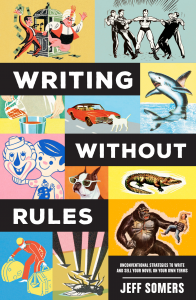The Short Story Report

As regular readers of this blog (or, you know, old-fashioned stalker-types [waves cheerfully out window]) well know, I’m a big believer in short stories, as art, exercise, and commerce. A lot of writers avoid short stories, for a variety of reasons. Some just don’t like the constraints, preferring to spend their time working on a 5,000,000 page fantasy epic they expect to finish about 35 years after they have died. Some think that short stories don’t pay well enough to be worth the trouble.

Self-promotion is exhausting.
Neither of these folks are wrong, per se, but personally have always found short stories a lot of fun, useful in honing my writing skills, and surprisingly lucrative (sometimes). It’s true that most short story sales will result in token payments that don’t even begin to cover the blood and treasure of your imagination used in its writing. But they actually pay better than you might think. I discuss short stories a lot in my upcoming writing book Writing Without Rules (order 75 copies today!), because I think they’re a fantastic tool for all fiction writers, but here’s the specific breakdown for 2017.
The Numbers
So, every year I write at least 12 new stories (one a month as an exercise), and submit as many as I can to markets. This year I wrote 21 short stories. I submitted 71 stories to markets (note, that isn’t 71 separate stories, it’s a small number of stories submitted to multiple places). I sold 1 new story (Arthur Kill) and saw 4 published (The Kendish Hit, Last Best Day, The Bonus Situation, and Nigsu Ga Tesgu). I earned $1722.95 from short stories in 2017.
Sales-wise and money-wise, not my best year. Publication-wise, much better; any time you see 4 titles in print or digital, it’s not a bad year. By comparison, in 2016 I submitted stories 54 times, sold three, and earned $4,227.52 from short stories. Then again, in 2014 I earned $34.93 from short stories. Every year is a financial adventure when you’re a writer.
The thing about short stories is you never know how long the Long Tail might be. Other writers have made this point, but I’ll echo it: In 2005 I gave a short story to an anthology for $0. Ringing the Changes was chosen to be in Best American Mystery Stories 2006 and ultimately I earned $765 from it. In 2009 I placed the story Sift, Almost Invisible, Through in the MWA anthology Crimes by Moonlight, which paid royalties to the contributors, and earned $620.14 over a few years. These aren’t huge amounts of money, but the point is you never know how long or how well a short story sale might earn out.
Most importantly, of the 21 stories I wrote this year, I think 7 have potential. That’s an unusually high number, actually. Many years I write 10-20 stories and don’t think any of them have legs. So even if I’m fooling myself and only 3 or 4 of the new crop are worth submitting, it’s still a pretty good year, creativity-wise. And since I am always on the look out for signs of mental decline and encroaching decrepitude, this is encouraging.
Unless I’m already disconnected from reality and the new stories are all gibberish. Happy New Year!










